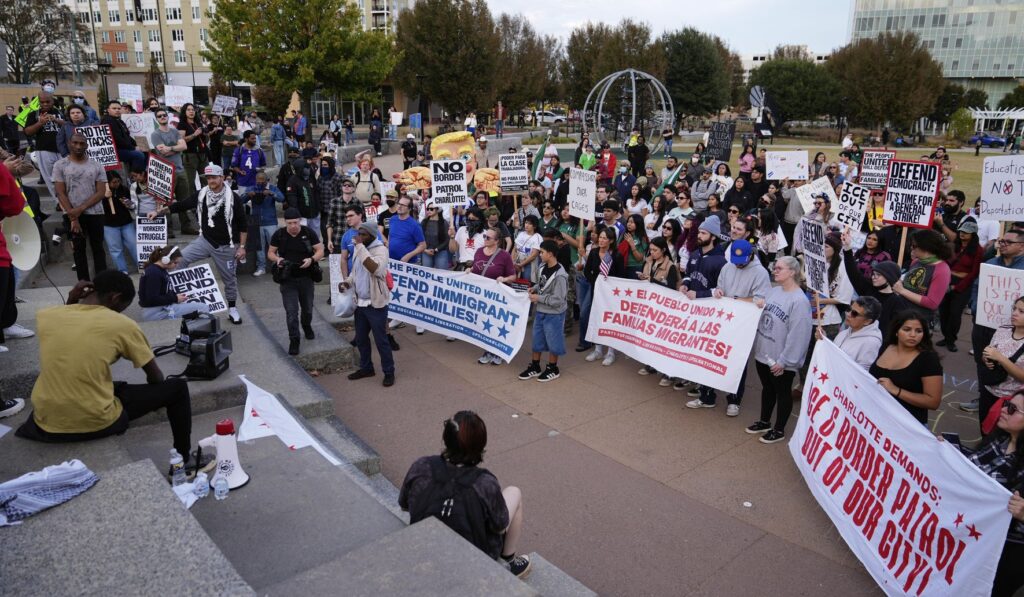Federal agents conducted interior immigration arrests in Charlotte on Sunday, and residents reported encounters with officers near churches and apartment buildings.
A top Border Patrol commander said agents made dozens of arrests in North Carolina’s largest city on Sunday, highlighting an aggressive interior enforcement push by federal authorities. The agency framed the operation as targeted actions against individuals with immigration violations. Local residents reacted with alarm after spotting agents in neighborhoods, particularly near places of worship and multiunit housing.
Those on the ground described officers approaching people outside churches and at apartment complexes, creating a tense atmosphere for families and congregations. The presence of federal agents in everyday community spaces forced neighbors to ask who would be affected next. People voiced confusion and fear as they tried to understand whether routine daily activities might lead to detention.
From a Republican perspective, enforcing immigration laws inside the country is a basic duty of the federal government and a necessary component of public safety. When agents locate and remove individuals who lack legal status after due process, they are upholding the rule of law that protects communities. Supporting clear, consistent enforcement sends a message that legal pathways matter and that violations carry consequences.
At the same time, the operations underscore the need for coordination between federal and local authorities so that lawful enforcement does not unnecessarily disrupt civilian life. Critics argue sanctuary policies hamper cooperation and leave dangerous gaps that embolden illegal behavior. Republicans point to those policy gaps as part of the reason federal intervention becomes necessary in city streets and neighborhoods.
Civil liberties remain a concern and should be handled with respect, but that does not mean tolerance for unchecked illegal immigration. Properly conducted arrests rely on valid warrants or clear statutory authority, and agencies must document their actions to preserve transparency. Accountability does not equal inaction; it means enforcing the law while protecting basic rights.
Some city officials and community advocates publicly pushed back against the timing and tactics of the enforcement activity, arguing that churches and residential areas should be treated as sensitive locations. Those voices reflect legitimate worries about community trust and the risk of scattering families. The debate highlights a broader clash between local priorities and federal responsibility to enforce immigration statutes.
Details on how targets were selected remain limited in public statements, but the operation fits a pattern of increased interior enforcement by federal immigration authorities this year. Interior enforcement has returned to the national conversation as border and migration pressures continue to shape policy debates. Republicans argue that a robust interior posture complements stronger border controls and deters future illegal crossings.
Church leaders reported congregants expressing unease after encountering agents, and tenants at several apartment buildings said they saw officers speaking to residents. Those interactions are driving local calls for clearer communication so people know their rights and the limits of enforcement. Churches and housing complexes have become focal points for community conversations about safety and legal responsibility.
Policy implications are immediate: state and local leaders must decide whether to cooperate with federal officials, and federal agencies must balance enforcement with minimizing harm to innocent residents. The louder national debate over immigration policy frames these local incidents, but the outcomes will be determined at city council meetings, courtrooms, and through federal guidance. Republicans emphasize restoring order through enforceable laws while urging practical steps to prevent disruption to law-abiding communities.
The events in Charlotte will likely spur renewed calls on both sides for clearer rules and better coordination, as well as renewed public discussion about how interior enforcement fits into a broader immigration strategy. Communities will push for transparency about operations and assurances that enforcement targets those who pose threats to public safety. The political arguments will continue, but the legal and practical decisions made next will shape how similar situations play out in cities across the country.



